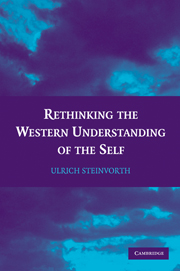Part V - A Self-Understanding Not Only for the West
Published online by Cambridge University Press: 05 June 2012
Summary
Don't trust truth if it's trivial.
Xun ze, 250 BCI have discussed value spheres, as they are the institutions modernity centers on. The prevailing Lockean conception of the self and the allied utilitarian approach fails to take account of both their destructive and constructive potential. Thus, they have contributed to the decline of the West, while following the Cartesian conception might give it new life. Theorists can overrate the social effects of conceptions, as concepts are their medium, but they also can underrate them, as they are eager not to fall victim to the prejudices of their profession. Conceptions are a factor in social dynamics; moreover, they are a factor we can change. The advertising industry exploits this possibility without regard to truth and moral rightness. Philosophy should do with regard.
We have found a list of value spheres that form a fairly broad spectrum of possibilities for enacting the ambition of extraordinariness inextricably connected with the self. Establishing such a system would strengthen constructive powers. It also would realize the idea of sphere autonomy that includes and is included by the idea of individual autonomy, since autonomous spheres presuppose autonomous individuals and individual autonomy needs spheres for individuals to develop their capabilities. It would redeem the promise of modernity, everyone's equal right to liberty, as the spectrum is broad enough to offer everyone an opportunity for choosing a life they think suits them. Yet of course, there are a lot of objections to the project.
- Type
- Chapter
- Information
- Rethinking the Western Understanding of the Self , pp. 167 - 168Publisher: Cambridge University PressPrint publication year: 2009

